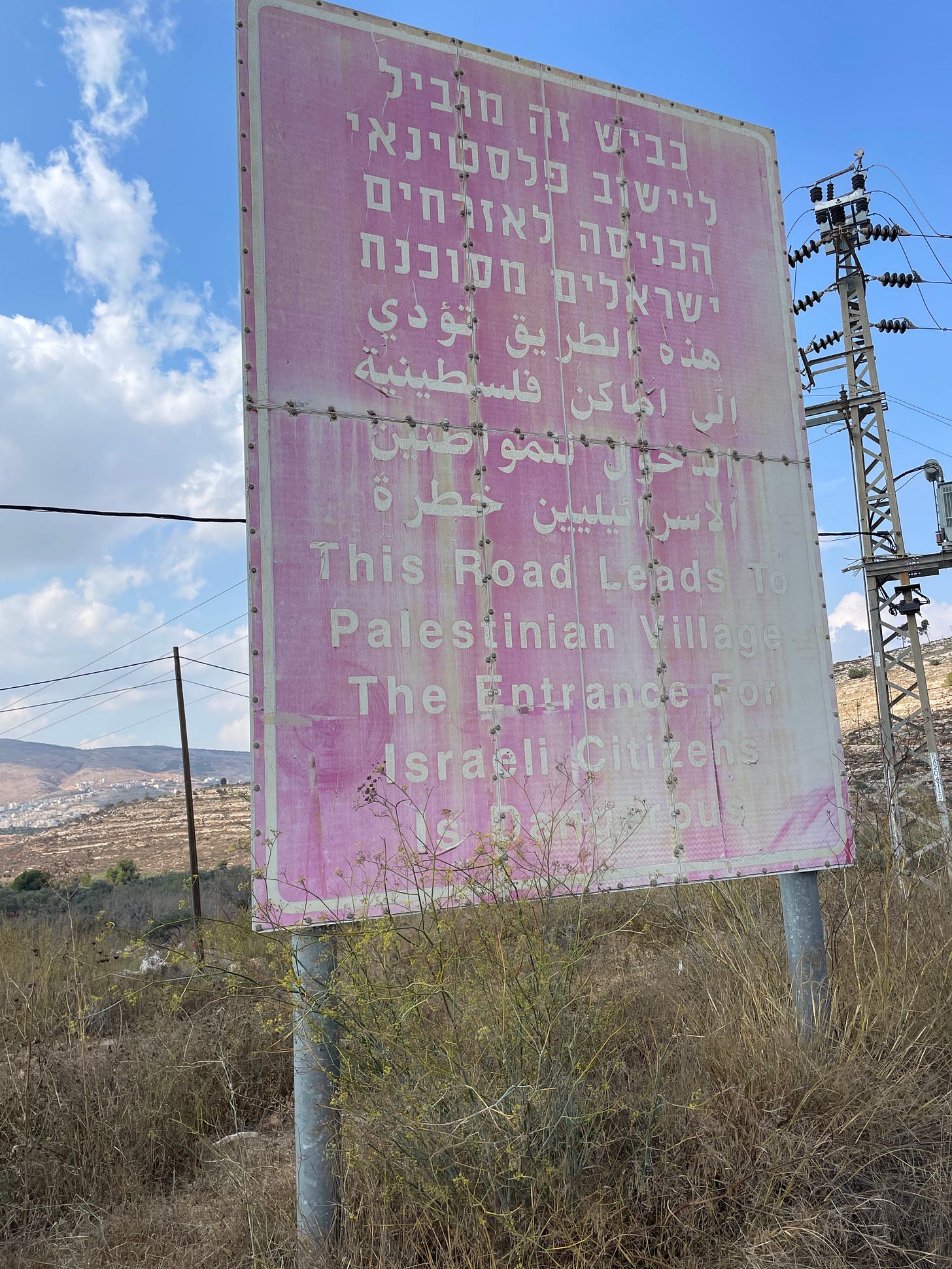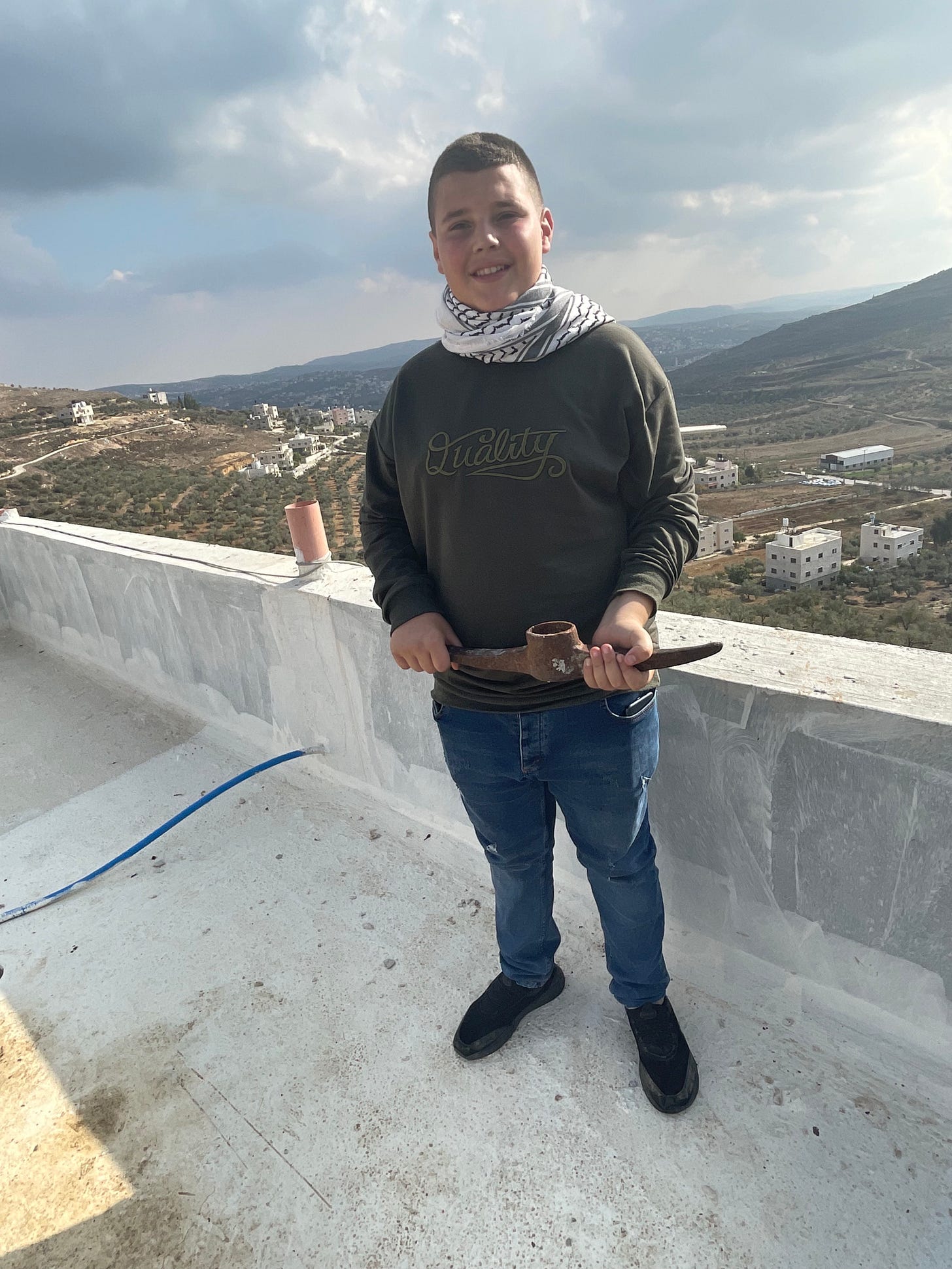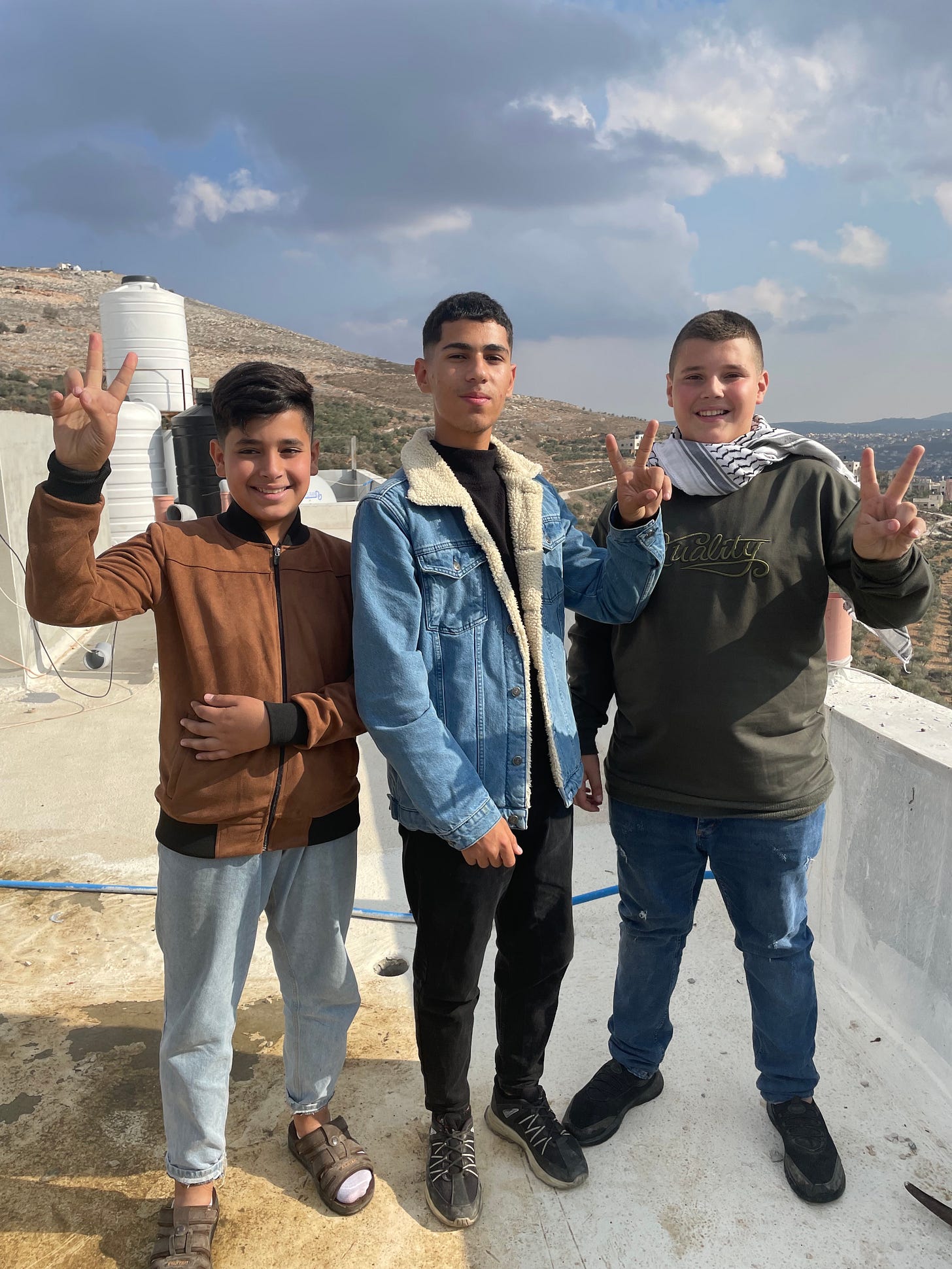We will stop here, our guide from B'tselem says, the van idling in front of a building in Burin, in the West Bank. We have been driving all morning over land that looks like California desert, by turns moonscape - how can anything grow on yellow rock? - and lush with cactus fruit and date palm and, in lieu of Joshua trees, olive trees, which we will see later in cultivated rows, lush and green, but along the roads they are gnarled and dusty, with leaves that appear weightless and soft. I don't know if they are soft. We do not stop to pet the olive trees. We do stop to look at the guardhouse at Nablus, we get out of the van and listen again to how Palestinians are cut off from their land by edict and by force, and because we have gotten out of the van and maybe because one in our party wears a headscarf, Israeli soldiers block our vehicle with theirs and ask, what are you doing here? Where are you going?
We are going to Huwara, we are going to Itamar, as we drive our guide explains who can go where, no Israelis in Area A, no Palestinians in Area C, there are laws for who can build where, laws that can be disobeyed by some and not others, and it is impressed upon us, we Americans who have just come through an election, how democracy plus occupation by definition cannot exist; how no one anymore pretends to work toward a two-state solution, that the future is the present, though that can change. And if we think what we are seeing now is bad, recall the current arrangements have been put in place by regimes more liberal than the one voted in last week, and will the openly racist Ben-Gvir accelerate the geographical reengineering in the West Bank, in Gaza? That the people of Israel are willing to find out should tell us something; that any debate now is merely "a tactical argument. The trajectory will not change, only the pace."
That pace accelerates. We are shown maps, from 1948, from 1967, from today, look at how the land available to Palestinians shrinks, let us drive the van up to this well the settlers molest, they break the locks, they swim in it so that the drinking water is befouled and also cut the water lines so the trees cannot grow. I think how it's the oldest trick in the book, cutting people off from water, and I remember a story from the Holocaust, how the tactic at one woman's camp was to deny prisoners water, and how a survivor later spoke of generosity among the women, how one would spare a sip for another, a story contradicted by another survivor who said that was not true, that when you have no water there is no honor only survival.
We are told at the apartment building that we will meet some Palestinians now. Up six flights, seven, past pigeon feathers and used Q-tips on the steps and hanging laundry and one bushel of onions on the landings. Up a ladder to the roof. Look here, the guide points; see the healthy olive groves, the green ones? Those belong to the settlers, who take the water, who have modern equipment, whereas the people here, they are allowed to tend their fields only three days a year, and what can you do in three days? When it takes one day to prepare the ground for harvest, or when you get to your grove and find the trees have been cut, or that the oldest ones, some hundreds of years old, have been uprooted and replanted on settler land, land you are not allowed on or to pass through, there is always violence, and see these houses here? Sometimes it takes thirteen years to build one house, the settlers keep setting them on fire; they will tell you, our guide says, as three boys emerge onto the roof, fresh-faced and ready, hellos all around, in English, in Arabic.
Tell them what happened, says our guide, who translates.
'Well our cousin got hit in the eye,' says Nadem, 14, and shows me on his phone a close-up of an eye, with a large red cut and welt. How did it happen?
The boys all tell the story at once. It was two weeks ago, between four and five in the afternoon. They were by a small store and saw settlers coming down the hill. Were they the same ages as the boys?
'No, it's big. Men," says Adam, who is 13.
The men were running. Someone grabbed a bullhorn and called for others to help. A fight started by the store and the cousin was hit in the eye. With a fist? A rock? No, says Nadem, it was with something that proves hard to translate. He looks around the roof. Like this, he says, coming back with the head of a pickax.
The cousin was taken to a hospital in Jordan, he will be okay, but the violence, it's all the time, the boys say, and that two days ago, people - they did not see who - rolled burning tires down these hills, tires that bounced through the village and could have but did not this time set fire to the houses. The image of the tires terrifies me, it calls to mind a torture I hesitate to even look up, and here are these boys, sturdy as green saplings and bursting with cheer, and what are the possibilities they can stay this way, that they can face the daily indignities and keep growing strong, into men to whom the thought of what can be done with a burning tire would never occur?








Love this piece. Your writing is consistently rich and nuanced and I can tell how this trip is seeping into your soul. Whenever I go to Israel, I feel love for the people I meet but also exasperated that there is no end in sight to the conflict. It seems like the most complex issue in the world to me. I would never say this on Twitter but as a jew I blame the ultra orthodox jews for fanning the flames in the occupied territories as much as I blame Hamas. The one thing they both share is neither groups are gainfully employed. If they worked for a living they'd have something else to focus on. Hope I don’t get hated on for this.
Not to start a never-ending argument ... but there's a reason that "the land available to Palestinians shrinks" relative to 1948 and 1967 ... in both cases Israel was attacked. Not sure that's clear in the article.